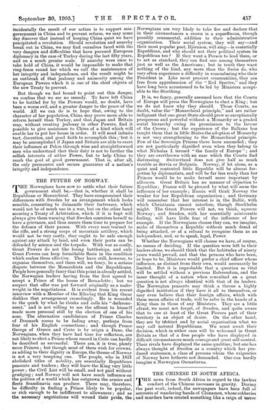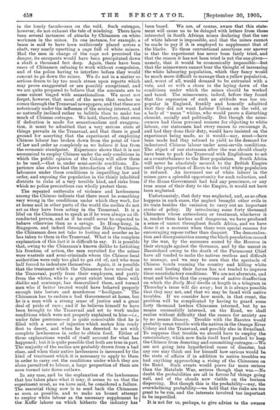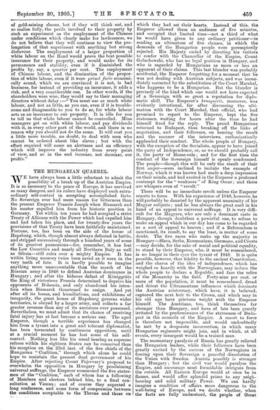in the lonely farmhouses on the veld. Such outrages, however,
do not exhaust the tale of misdoing. There have been several instances of attacks by Chinamen on white workmen in the mines. In one instance, for example, a beam is said to have been maliciously placed. across a shaft, very nearly upsetting a cage full of white miners. Had the men in charge of the cage not perceived the danger, its occupants would have been precipitated down a shaft a thousand. feet deep. Again, there have been cases of Chinamen refusing to work without compulsion, and of the police having to interfere before they would consent to go down the mines. We do not in a matter so serious desire to lay too much stress upon reports which may prove exaggerated or are possibly exceptional, and we are quite prepared to believe that the accounts are to some extent tinged with sensationalism. We must not forget, however, that most of the news that reaches us comes through the Transvaal newspapers, and that these are notoriously under the influence of the mining interest, and so naturally inclined rather to belittle than to make too much of Chinese outrages. We hold, therefore, that even if deduction is made for sensationalism and exaggera- tion, it must be admitted. that a very serious state of things prevails in the Transvaal, and that there is good ground for asserting that the experiment of employing Chinese labour has broken down from the point of view of law and order as completely as we believe it has from the economic standpoint. Experience shows that it is not economical to employ Chinese under the only conditions in which the public opinion of the Colony will allow them to be used,—that is, under semi-servile conditions. Ex- perience also shows that the introduction of the Chinese labourers under these conditions is imperilling law and order, and exposing the population in the thinly inhabited districts to risks of a very terrible kind, and risks from which no police precautions can wholly protect them.
The repeated outbreaks of violence and lawlessness among the Chinese indicate that there must be something very wrong in the conditions under which they work, for at home and in other parts of the world the coolies do not act as they have been acting in the Transvaal. It is a libel on the Chinaman to speak as if he were always an ill- conducted person, and as if he could. never be expected to behave otherwise than as a savage. In Hong-kong, in Singapore, and indeed throughout the Malay Peninsula, the Chinaman does not take to looting and murder as he has taken to them in the Transvaal. What is the complete explanation of this fact it is difficult to say. It is possible that, owing to the Chinaman's known dislike to forfeiting his freedom of action, the men recruited for the mines were wastrels and semi-criminals whom the Chinese local authorities were only too glad. to get rid of, and who were half forced to indenture themselves. Again, it is possible that the treatment which the Chinamen have received in the Transvaal, partly from their employers, and partly from the whites, who to a great extent treat them with dislike and contempt, has demoralised. them, and turned men who if better treated would. have behaved. properly enough into looters and murderous " hooligans." The Chinaman has to endure a bad. Government at home, but he is a man with a strong sense of justice and a great deal of pride of race ; and if he believes himself to have been brought to the Transvaal and set to work under conditions which were not properly explained. to him—i.e., under false pretences—it is quite conceivable that he is filled with a sense of injustice which makes him ready first to desert, and when he has deserted to act with complete lawlessness in order to obtain food. Either of these explanations would of itself account for what has happened; but it is quite possible that both are true in part. The majority of the coolies are probably drawn from a, bad class, and when their native lawlessness is increased by the kind of- treatment which it is necessary to apply to them in order to carry out the conditions under which they are alone permitted to labour, a large proportion of them are soon turned into fierce outlaws.
In any case, and be the explanation of the lawlessness that has taken place what it may, it seems to us that the experiment must, as we have said, be considered a failure. The essential thing now is to send back the Chinamen as soon as possible, and to make an honest attempt to employ white labour as the necessary supplement to the Kaffir labour on which hitherto the industry has been based. We are, of course, aware that this state- ment will cause us to be deluged with letters from those interested in South African mines declaring that the use of white labour is impossible, and that the mines cannot be made to pay if it is employed. to supplement that of the blacks. To these conventional assertions our answer is that the experiment has never been fairly tried, and that the reason it has not been tried is not the one given— namely, that it would be economically impossible—but that the mineowners cannot bear the thought of increasing the white labouring population, which they fancy would. be much more difficult to manage than a yellow population, and, worst of all, would. demand to be entrusted with a vote, and so with a share in the laying down of the conditions under which the mines should be worked and taxed. The mineowners, indeed, before they found that the expression of such an attitude was too un- popular in England, frankly and honestly admitted that they did. not want Labour Unions on the veld, or a body of " mean " whites, who would prove a disturbing element, socially and politically. But though the mine- owners had these personal reasons for objecting to white labour, our statesmen had every reason to encourage it, and had they done their duty, would have insisted on the experiment being made, as it would—nay, must—have been made had they refused to yield to the demand. for indentured Chinese labour under semi-servile conditions. The object of our statesmen after the war should. clearly have been to pack the Transvaal with Englishmen to act as a counterbalance to the Boer population. South Africa will never be absolutely secured. to the British Empire until the proportion of Boers to the total white population is reduced. An increased use of white labour in the mines gave a splendid opportunity for such reduction, and if the Home Government had had any prescience, or any true sense of their duty to the Empire, it would not have been neglected.
Unfortunately, that duty was neglected, and, as so often happens in such cases, the neglect brought other evils in, its train besides the omission to carry out an important stroke of policy. By introducing some forty thousand. Chinamen whose antecedents or treatment, whichever it is, render them lawless and dangerous, we have produced a sense of unrest throughout South Africa, and we have done it at a moment when there were special reasons for encouraging repose rather than disquiet. The demoralisa- tion and disorganisation among the black population caused by the war, by the successes scored by the Hereros in their struggle against the Germans, and by the unrest in Basutoland owing to the death of the Paramount Chief have all tended to make the natives restless and difficult to manage, and we may be sure that the spectacle of Chinese bands roaming the country and killing white men and looting their farms has not tended to improve these unsatisfactory conditions. We are not alarmists, and trust and believe that the symptoms of native disaffection on which the Daily Mail dwells at length in a telegram in Thursday's issue will die away; but it is always possible that they may not, and that we may be faced. with native troubles. If we consider how much, in that event, the problem will be complicated. by having to guard some forty thousand lawless Chinamen interned, but by no means successfully interned, on the Rand, we shall realise without difficulty that the causes for anxiety are by no means illusory. Trouble with the Basutos would probably mean trouble with the natives in the Orange River Colony and the Transvaal, and possibly also in Swaziland. To suppress that trouble we should have to employ the constabulary, which now finds itself hard pushed. to keep the Chinese from desertina.b and committing outrages.—We are not going into hypothetical cases of disaster, but any one may think out for himself how serious would be the state of affairs if in addition to native troubles we had anything approaching a rising of the Chinamen on the Rand. Such events would prove far more serious than the Matabele War, serious though that was.—No doubt the probabilities are all in favour of things going well, and of the clouds now visible on the horizon dispersing. But though this is the probability—nay, the overwhelming probability—we hold. that the risks are too great to be run, and the interests involved too important to be imperilled.
It is not for us, perhaps, to give advice to the owners of gold-mining shares, but if they will think out, and so realise fully, the perils involved to their property by Such an experiment as the employment of the Chinese under conditions which clearly make for lawlessness, we do not believe that they will continue to view the pro- longation of that experiment with anything but strong disfavour. The employment of a larger proportion of white labour on the Rand would prove the best possible insurance for their property, and would make for its permanence and stability, even if it diminished the profits by, say, a quarter per cent. The employment of Chinese labour, and the diminution of the propor- tion of white labour, even if it were prima facie economi- cally sound, which we are convinced it is not, is bad business, for instead of providing an insurance, it adds a risk, and a very considerable one. In other words, if the shareholders were wise, they would say to their managing directors without delay :—" You must use as much white labour, and not as little, as you can, even if it is trouble- 61)nie and disagreeable to you to do so, for white labour acts as an insurance to our property. It is idle for you to tell us that white labour cannot be controlled. Mine managers get on with white labour, and pay dividends with it, in every other part of the world, and there is no reason why you should not do the same. It will cost you a little more trouble, no doubt, to deal with men who cannot be ordered about like slaves ; but with the effort required will come an alertness and an efficiency which will improve the industry from every point of view, and so in the end increase, not decrease, our profits."












































 Previous page
Previous page